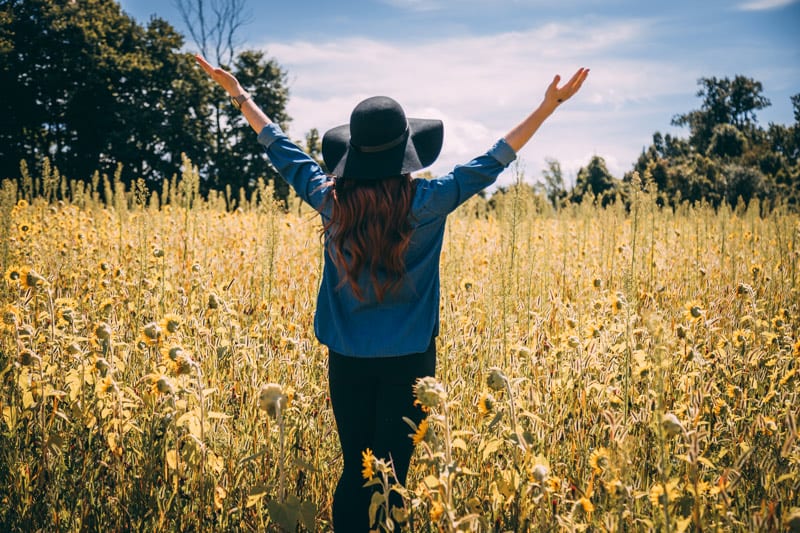Gratitude is something that each one of us must practice on a daily basis, anxiety, or no anxiety. It makes us aware of all the good things in our lives that we usually take for granted.
If you’re suffering from anxiety, you’re not alone. According to research, it affects almost 18.1% of the US population each year. In this particular state of mind, it’s difficult to find things that you are thankful for. But trust us, they’re there.
Anxiety can make you feel sad. Things may seem amiss. How can you practice gratitude when you’re upset with everything that’s going on with your life? When you stop focusing on the things that are haywire and start looking at the little things that make your life worth living, you slowly experience a shift in attitude. Your general outlook towards life changes, making you a happier person. This happiness, in turn, helps relieve anxiety and eventually improves your overall mental health.
The Scientific Impact of Gratitude on Anxiety
Gratitude increases neural modulation in the brain, in the prefrontal cortex, which regulates negative emotions. It also activates dopamine, the neurotransmitter responsible for making you feel good. The result is instant happiness, prompting you to engage in this practice over and over again.
Gratitude also curbs other symptoms of anxiety, helping you to deal with the disorder more effectively:
- It helps cure insomnia, according to a study published in the National Center for Biotechnology Information in the United States
- It reduces stress hormones in the body
- It increases activity in the hypothalamus and positively impacts the bodily functions, memory, and emotions
The Psychological Effect of Gratitude
The training of your brain starts right from the moment you are born. You know an apple as an apple because you have been fed that information right since the beginning. Had you been told that a banana is an apple, your perception of the fruit would have been entirely different today.
The same is the case with your thoughts and fears. If you constantly tell yourself that things are wrong and you are unhappy, you will believe it, even if that’s not true. Similarly, if you tell yourself that things are great and worthy of gratitude, you start believing it. This makes you happier and eases your symptoms of anxiety in the long run.
How To Practice Gratitude
Just saying thank you is not enough. It might give you instantaneous gratification, but to rewire your brain, it needs to become a habit. There are certain practices that you can adopt to make gratitude a regular part of your personality.
1. Keep a Journal
Maintain a gratitude journal, and every night, write down in it things that you are thankful for.
As you notice all the positive things in your life while penning them down, you realize that life is beautiful and there are so many memories to cherish that you had just hidden in a box that got lost somewhere in your brain.
2. Meditate
Everyone suggests meditation as a way of dealing with almost everything. But it’s extremely helpful in practicing gratitude. Find a peaceful corner and sit with your eyes closed. Focus on all the good things in your life and start thanking your stars. You’ll eventually become a thankful person by nature.
3. Call Up Loved Ones And Thank Them For Being a Part of Your Life
This may seem silly, but it goes a long way towards practicing gratitude. Call up all your loved ones, and thank them for their presence in your life. Tell them how they’re being there enhances and enriches your life. You’ll start valuing your relatives more than ever and acknowledge how lucky you are that they’re a part of your life.
Final Thoughts – Practicing Gratitude For Anxiety
Practicing gratitude is not usually recommended as a remedy for relieving anxiety. It’s surprising how underrated it is. Nonetheless, it’s extremely effective. Anxiety usually occurs due to unwanted thoughts, worries, and fears.
By accepting and acknowledging that there are things in your life to be thankful for, you realize that your fears and worries are irrational, and don’t deserve so much time and attention. This helps ease anxiety and allows you to do the things you had been holding yourself back from doing. Worth a shot, right – dealing with anxiety and becoming a better person at the same time?
So what are you thankful for?

Photo by Alora Griffiths on Unsplash
The opinions and views expressed in any guest blog post do not necessarily reflect those of www.rtor.org or its sponsor, Laurel House, Inc. The author and www.rtor.org have no affiliations with any products or services mentioned in the article or linked to therein. Guest Authors may have affiliations to products mentioned or linked to in their author bios only.
Recommended for You
- Social Anxiety in Early Recovery: Navigating Social Situations Sober - December 29, 2025
- How to Stop Nail Biting: What Finally Worked for Me After Years of Failed Attempts - December 26, 2025
- Dealing With Toxic Family Members: A Survival Guide for Family Gatherings - December 22, 2025





